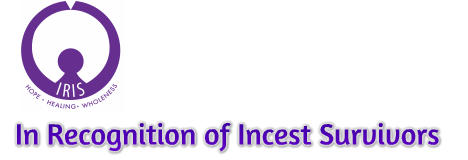Each of us has found his or her unique voice, and each
is compelling. We have found our own, and you are reading it now. People who did not know us “before” have a hard time imagining who we must have been
before we recovered our power of speech. And, of course, we insist upon being heard – it is our right.
We have learned the right to be heard is not always honored by the people and institutions around us. We have learned that we must take responsibility to use our voices in ways that allow people to hear the message. We speak with passion, but respectfully. We speak with emotion, but from a place of reason. We raise our voices, but not in hysteria. We persist
when rebuffed, but not obsessively – we know when to give up and move on.
Not everyone is ready to hear what we have to say.
The main things we want everyone to know about a survivor’s right to be heard:
- Incest victims and other household members are systematically taught that their voices are invalid – and so we become mute about the incest, and learn never to ask for what we need.
- Sometimes when we begin to find our voice, we can over-use it or under-use it.
We need practice with loving and understanding adults to find appropriate boundaries about sharing. - The ultimate experience in restoring our voices comes when we begin to disclose the
incest to people we trust. - We can take our time, develop a loving support system, and decide systematically how and when we will disclose the incest to family members.
- Giving and receiving a disclosure is a sacred exercise and should be treated as such.
- Take a break from the intensity of finding your voice – when we finally learn to speak,
we need to discharge all of the negative thoughts, feelings and experiences we have held inside for so long, but it can be overwhelming. Treat yourself gently, and try to go easy on your support system. - Please make sure you have adequate support before you choose to disclose.
- Support people should count confidences as sacred, but must break the confidence with or without permission if a child is still at risk in the control of the predator.
For Family, Friends, and Neighbors
If you are reading this because someone you love is surviving the effects of incest, please be sure to appreciate yourself for being a safe and trustworthy person in the life of your loved one. To be chosen as a witness for the first healing struggles of a person learning to disclose the unspeakable is a sacred trust, worthy of your highest efforts as a human being. If you are part of the support system of a survivor, there are many ways you can encourage us in our effort to find our voices.
First of all, let us have full control of the time, place, and content of the discussion. Do not try to control the discussion in any way – let us decide how much to tell you. If you have questions, ask first if it is all right to ask a question, and let it be known that we do not have to answer. Do not ask questions that make it seem that you are questioning our credibility, even if you are entirely baffled by what we say. We are learning how to speak about this terrible wound and might not be able to do it perfectly at first. Open up all of your sensitivity and follow your gentlest intuition.
Listen actively – that is, keep reasonable eye contact, nod, and use your body language to let us know that you are open and safe for us. Above all, be yourself and express your feelings. If you are sad, cry. If you are sorry or angry, say so. Nevertheless, try very hard to not hijack the conversation with your own emotional reaction – keep it about us. If you feel like hugging us, ask first –a lot of incest survivors cannot handle physical contact when they are having a flashback, but some people crave it. Ask. Above all, listen with compassion. Ask what you can do to help. Offer to accompany us along the path, when you can. Ask us how you can help.
Tell us we can call you at 3:00 AM.
We hope that you are getting the message that the support person’s two main tasks are to ask, and to offer. Don’t ask probing questions – ask us what we feel. Ask us what we
need. Ask us what we want. We might not always know what we want, but we have a right to be in charge of our disclosure and hour recovery, especially after so much of our own right to control our lives has been taken from us so brutally. Offer to help. Offer to listen, to brew tea, to take us to the doctor, to travel with us to Oklahoma to see our mother. Ask. Offer. Ask with all your resources, and be patient. We are learning to accept help after living a life where we hid, alone with our pain, and your offers will help us understand what resources are available to us.
Never offer something you cannot deliver, because if we do ask you for something that you have offered us, you must come through at all costs. We need to learn to accept help and to learn that we are not alone – do not set us up for disappointment. Be realistic, including telling us the truth about not being able to drop everything and go to Oklahoma.
When we ask you for something for which you do not have the resources, brainstorm with us for an alternative solution. Accompany us.
After disclosure, follow up. Don’t treat us differently. When we signal a need for “normal” time, please give us plenty of it. Do ask us how we are feeling and let us know that you are thinking of us and concerned for us. Don’t ask a lot of probing questions about what happened to us in your own effort to understand incest. We will tell you what we are comfortable telling you. Get on the Internet, get some books from the library, and do your own research if you want to understand incest. We know someone who purchased several ‘Zines on incest, written by incest survivors and the people who love them, because she had friends who were survivors and she wanted to know more about the experience of incest so she could be supportive. Our hats are off to her. Having said that, after you have done some reading, do not assume that our experiences were just like in the books– we have our own story!
Above all, treat these disclosures as sacred. Never, ever, tell our story to another person without our prior permission. The one time a confidence must be broken is if we disclose incest that is currently happening or if the predator still has access to vulnerable children –then it is your duty as a human being to tell. Before you do so, tell us that this is what you must do. We might be terrified that we will be in danger when the predator realizes we disclosed the abuse. We might try to talk you out of it with tears, threats, or any other strategy we can devise. You must prevail. Tell us that you will stand by us every minute and do anything you can to keep us safe and to honor our privacy – but that you must save the currently vulnerable children from meeting the same horrible fate that we endured, or are enduring. It won't be easy for us, because many of us still live in fear, but we will understand.
Do not go to the authorities alone – make sure a person other than the survivor such as a close friend, counselor, or clergy member knows what you are about to do. Never forget to
access your own support system.
First of all, let us have full control of the time, place, and content of the discussion. Do not try to control the discussion in any way – let us decide how much to tell you. If you have questions, ask first if it is all right to ask a question, and let it be known that we do not have to answer. Do not ask questions that make it seem that you are questioning our credibility, even if you are entirely baffled by what we say. We are learning how to speak about this terrible wound and might not be able to do it perfectly at first. Open up all of your sensitivity and follow your gentlest intuition.
Listen actively – that is, keep reasonable eye contact, nod, and use your body language to let us know that you are open and safe for us. Above all, be yourself and express your feelings. If you are sad, cry. If you are sorry or angry, say so. Nevertheless, try very hard to not hijack the conversation with your own emotional reaction – keep it about us. If you feel like hugging us, ask first –a lot of incest survivors cannot handle physical contact when they are having a flashback, but some people crave it. Ask. Above all, listen with compassion. Ask what you can do to help. Offer to accompany us along the path, when you can. Ask us how you can help.
Tell us we can call you at 3:00 AM.
We hope that you are getting the message that the support person’s two main tasks are to ask, and to offer. Don’t ask probing questions – ask us what we feel. Ask us what we
need. Ask us what we want. We might not always know what we want, but we have a right to be in charge of our disclosure and hour recovery, especially after so much of our own right to control our lives has been taken from us so brutally. Offer to help. Offer to listen, to brew tea, to take us to the doctor, to travel with us to Oklahoma to see our mother. Ask. Offer. Ask with all your resources, and be patient. We are learning to accept help after living a life where we hid, alone with our pain, and your offers will help us understand what resources are available to us.
Never offer something you cannot deliver, because if we do ask you for something that you have offered us, you must come through at all costs. We need to learn to accept help and to learn that we are not alone – do not set us up for disappointment. Be realistic, including telling us the truth about not being able to drop everything and go to Oklahoma.
When we ask you for something for which you do not have the resources, brainstorm with us for an alternative solution. Accompany us.
After disclosure, follow up. Don’t treat us differently. When we signal a need for “normal” time, please give us plenty of it. Do ask us how we are feeling and let us know that you are thinking of us and concerned for us. Don’t ask a lot of probing questions about what happened to us in your own effort to understand incest. We will tell you what we are comfortable telling you. Get on the Internet, get some books from the library, and do your own research if you want to understand incest. We know someone who purchased several ‘Zines on incest, written by incest survivors and the people who love them, because she had friends who were survivors and she wanted to know more about the experience of incest so she could be supportive. Our hats are off to her. Having said that, after you have done some reading, do not assume that our experiences were just like in the books– we have our own story!
Above all, treat these disclosures as sacred. Never, ever, tell our story to another person without our prior permission. The one time a confidence must be broken is if we disclose incest that is currently happening or if the predator still has access to vulnerable children –then it is your duty as a human being to tell. Before you do so, tell us that this is what you must do. We might be terrified that we will be in danger when the predator realizes we disclosed the abuse. We might try to talk you out of it with tears, threats, or any other strategy we can devise. You must prevail. Tell us that you will stand by us every minute and do anything you can to keep us safe and to honor our privacy – but that you must save the currently vulnerable children from meeting the same horrible fate that we endured, or are enduring. It won't be easy for us, because many of us still live in fear, but we will understand.
Do not go to the authorities alone – make sure a person other than the survivor such as a close friend, counselor, or clergy member knows what you are about to do. Never forget to
access your own support system.



